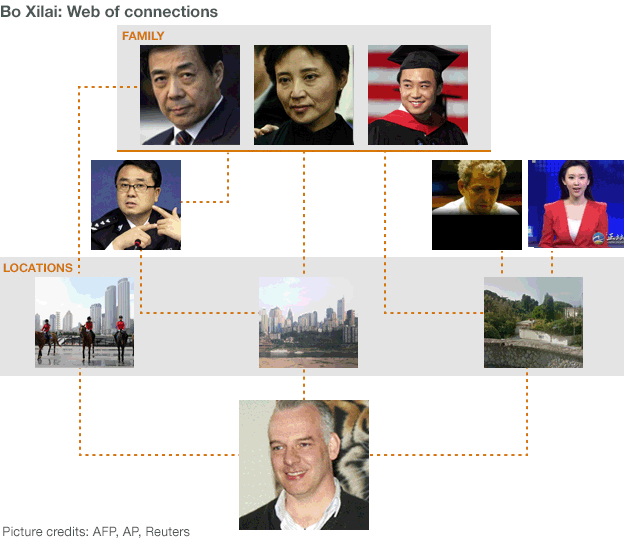Bo Xilai scandal: Key players
- Published
The death of British businessman Neil Heywood in the Chinese city of Chongqing in November 2011 sparked the biggest shake-up to hit the Communist Party in decades and exposed high-level political divisions.
Bo Xilai
Former Communist Party chief of Chongqing and Politburo member
Mr Bo, the son of a famous Communist Party hero, was once a political high-flyer and described as the nearest China had to a Western-style politician. He ran the coastal city of Dalian and was commerce minister before becoming Party chief of south-western metropolis of Chongqing. He was removed from office following Neil Heywood’s death and was charged with bribery, corruption and abuse of power.
Gu Kailai
Lawyer and wife of Bo Xilai
Ms Gu, whose father was a prominent revolutionary general, is a well-known lawyer and second wife of Bo Xilai.
She studied at Peking University before opening the Kailai law firm in Beijing. Fluent in English, she and her husband were once one of China's most powerful couples. Last year, she was convicted of Mr Heywood's murder, reportedly over a deal gone wrong, and given a suspended death sentence.
Bo Guagua
Son of Bo Xilai and Gu Kailai
Educated at the exclusive British private school Harrow, followed by Oxford and Harvard Universities, Bo Guagua has been described as one of China's "princelings" - the descendants of revolutionary leaders often criticised for their lavish lifestyles. Since his parents’ fall, Bo Guagua has remained in the US, where he is preparing to study law at Colombia University in New York. In a statement issued ahead of Mr Bo’s trial, Bo Guagua said he hoped his father would be allowed to defend himself "without constraints".
Wang Lijun
Former Chongqing police chief
Mr Wang, once a popular police chief and Bo Xilai’s deputy in Chongqing, began his career in law enforcement in the Inner Mongolia region before moving to Chongqing in 2008. He worked closely with Mr Bo but, after an apparent falling out, Mr Wang fled to the US consulate in Chengdu, near Chongqing, where he raised concerns about the circumstances of Neil Heywood’s death. Mr Wang has since been jailed for 15 years, charged with defection, power abuse and bribe-taking.
Patrick Devillers
French architect
Mr Devillers is believed to have met Bo Xilai and Gu Kailai in the 1990s while living in Dalian and reportedly helped design street grids in the port city while Mr Bo was mayor. French documents quoted by the Wall Street Journal and New York Times said he also oversaw the running of a villa in the South of France - allegedly belonging to Mr Bo - between 2001 to 2007. He was detained in Cambodia, where he lives, before voluntarily flying to China in July 2012. Reports say Chinese authorities wanted to talk to him as a witness in the Neil Heywood case.
Jiang Feng Dolby
Television presenter and business woman
Mrs Dolby, born in China but now a British citizen through marriage, is well known in China as a state TV presenter. However, after moving to Britain she ran an educational consulting company, which it is claimed helped get the children of wealthy Chinese couples into leading British and American schools and universities. Mrs Dolby was named in official documents quoted by the Wall Street Journal as the manager of a villa in the south of France that is expected to be one of the key pieces of evidence at Mr Bo's trial.
Dalian
Major seaport in north-eastern China
It was here that Bo Xilai's political career was set on the fast track when he was appointed mayor. Mr Bo was credited with developing Dalian from an unremarkable port city to a showcase for China's economic boom. It was also in Dalian that Mr Bo and Gu Kailai reportedly first met Mr Heywood and Mr Devillers.
Chongqing
Major city in south-western China
Bo Xilai was appointed Communist Party chief of Chongqing in 2007. Wang Lijun, the city’s former police chief, was his deputy. Mr Bo became well-known for a high-profile crackdown on crime and advancing the "Chongqing model" of development, which spent heavily on developing public housing and infrastructure. However, his ambition and flamboyant style earned him enemies and raised eyebrows among party leaders back in Beijing. It was in a hotel room in Chongqing that British businessman Neil Heywood was found dead in November 2011.
French villa
Cannes, France
A six-bedroom villa in the south of France is expected to play a role in the trial of Bo Xilai. The $3.5m (£2.2m) property in Cannes was allegedly given to Mr Bo as a bribe. It it claimed to have been bought by Xu Ming, a billionaire backer of Mr Bo in Dalian. French documents quoted by the Wall Street Journal and the New York Times state people close to the Bo family have been involved with the villa since 2001. French architect Patrick Devillers, British businessman Neil Heywood and Feng Jiang Dolby, a former presenter on China's state TV, have all overseen the running of the property, the papers said.
Neil Heywood
British businessman
Having enjoyed a privileged education at Harrow school, Mr Heywood moved to China in the early 1990s where he learned Mandarin, married his Chinese wife Wang Lulu and started a business career. The father-of-two worked as a consultant to foreign businesses seeking investment in China. It was while living in the north-eastern port city of Dalian in the mid-1990s that Mr Heywood met Bo Xilai - then the city’s mayor - and his wife Gu Kailai. More than a decade later, Mr Heywood was found dead in a hotel room in the south-western city Chongqing - where Mr Bo had since become Communist Party chief. In 2012, Gu Kailai and an aide were convicted of poisoning him because of "economic conflict".
The case led to the dismissal of Chongqing party boss and former high-flier Bo Xilai, who was tried in August 2013 for bribery, corruption and abuse of power. His wife, Gu Kailai, has been convicted of killing Mr Heywood.
The BBC profiles the key players.
Neil Heywood
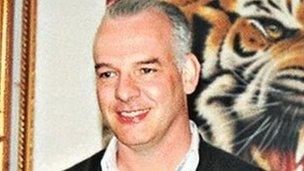
The death of 41-year-old British businessman Neil Heywood is at the heart of the scandal.
Born in 1970, Mr Heywood was educated at Harrow School and Warwick University.
He lived in China from the early 1990s, where he learned fluent Mandarin. He was a consultant to foreign businesses seeking investment in China, setting up several companies and advising clients.
Mr Heywood married a Chinese woman, Wang Lulu, and the couple had two children.
It was while living in the north-eastern port city of Dalian in the mid-1990s that he met the mayor, Bo Xilai, and his wife Gu Kailai. By 2007, Mr Bo had been appointed Communist Party chief of Chongqing.
The nature of Mr Heywood's association with Mr Bo and Ms Gu is not clear, but he has been described in some reports as a financial middleman.
Mr Heywood was found dead on 15 November 2011 at a hotel in Chongqing.
Chongqing's Public Security Bureau told British consular officials the cause of death was "overconsumption of alcohol" and his body was then cremated, a decision taken by his family.
But the case was then reopened. Gu Kailai and her aide were convicted in August 2012 of poisoning him to death because of "economic conflict".
Gu Kailai

The second wife of Bo Xilai, Gu Kailai was a well-known lawyer whose father was a prominent revolutionary.
Gu Kailai studied at Peking University and then opened the Kailai law firm in Beijing. Fluent in English, she wrote a book about her legal battles called Winning a Lawsuit in the US.
She and her husband were once one of China's most powerful couples - until an announcement in April 2012 that she was being investigated for the murder of Neil Heywood.
Gu Kailai was put on trial on 9 August 2012 for the murder - a crime she committed, according to state media, because of a conflict over economic interests.
A court official said she did not contest the charges, with state media saying she blamed her actions on a "mental breakdown".
She reportedly said she would "accept and calmly face any sentence" for poisoning the British businessman with cyanide.
On 20 August 2012, she was convicted of Mr Heywood's murder and given a suspended death sentence.
Bo Xilai
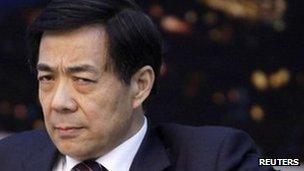
Bo Xilai was once a top politician tipped for the highest office.
Son of a famous communist hero, he ran the coastal city of Dalian and then became commerce minister before being named Communist Party chief of Chongqing.
He was known for launching two high-profile campaigns in Chongqing - one to promote China's communist past and the other to crack down on organised crime.
At home in front of the cameras, he was seen as both populist and charismatic. Many believed he was in the running for promotion in China's 10-yearly leadership transition in 2012.
But Mr Bo was removed as Chongqing party chief on 15 March of that year and suspended from the Communist Party's hugely powerful 25-member politburo and Central Committee.
On 25 July 2013, state media reported that Mr Bo had been charged with bribery, corruption and abuse of power.
His trial took place from 22 to 26 August. Mr Bo vigorously denied the charges levelled against him.
He was found guilty on all charges on 22 September and sentenced to life in prison.
Bo Guagua
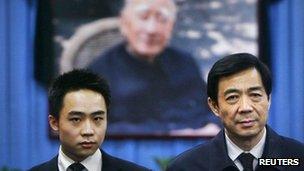
Bo Guagua, 25, is the son of Bo Xilai and Gu Kailai.
He studied at one of Britain's most expensive private schools, Harrow, before going on to Oxford University and then Harvard.
Bo Guagua has been described as one of China's younger "princelings" - the descendants of revolutionary leaders who are often criticised for the privileges they enjoy.
Photographs that appear to show him enjoying himself at parties have whizzed around internet sites, as has criticism of his perceived decadent lifestyle.
Chinese state media have also linked him to Neil Heywood, saying both he and his mother "were on good terms with Heywood. However, they had conflict over economic interests".
Bo Guagua was in the US studying at Harvard when scandal engulfed his family. He has since remained there and is believed to have started a law degree at Columbia University in New York.
He has issued statements defending his parents, most recently on 20 August 2013.
"It has been 18 months since I have been denied contact with either my father or my mother. I can only surmise the conditions of their clandestine detention and the adversity they each endure in solitude," he said in a statement to the New York Times.
"I hope that in my father's upcoming trial, he is granted the opportunity to answer his critics and defend himself without constraints of any kind."
Wang Lijun
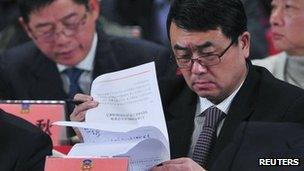
Wang Lijun was a popular police chief and vice-mayor in Chongqing whose flight to the US consulate in Chengdu in February 2012 brought Neil Heywood's murder out into the open.
Mr Wang started his career in law enforcement in 1984 in the Inner Mongolia region before moving to Chongqing in 2008.
He developed a reputation for being tough on organised crime and was even the subject of a TV drama, Iron-Blooded Police Spirits.
On 2 February 2012, the Chongqing city government said Wang had been shifted to another job - the first public confirmation of his falling out with Mr Bo.
He fled to the US consulate in Chengdu, near Chongqing, on 6 February that year. He spent the night at the consulate but was persuaded to leave a day later. Many believe he went there to seek asylum.
According to a statement from the UK Foreign Office on 17 April 2012, Wang made allegations about Mr Heywood's death while at the consulate.
Announcing his dismissal from the party in April of that year, Li Yuanchao, the head of the organisation department, called Wang Lijun's visit to the US consulate a "serious incident with very bad consequences".
On 5 September 2012, Wang was charged with defection, abuse of power and bribe-taking. After a two-day trial, he was jailed on 24 September for 15 years.
State media said he had "bent the law" by appointing an ally to oversee the investigation into Neil Heywood's death because he knew Gu Kailai was a key suspect - and that he had hidden a recording of her admitting the crime.
Zhang Xiaojun
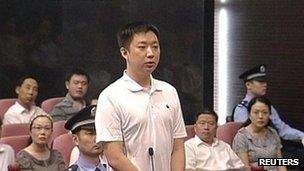
Zhang Xiaojun was charged alongside Gu Kailai with intentional homicide.
Zhang was said to be "an orderly at Bo's home" according to a Xinhua report on 18 April 2012. When Xinhua announced the charges on 26 July 2012, the news agency said he poisoned Neil Heywood to death, along with Gu Kailai.
He admitted his involvement in the murder during the trial, a court official said, and said he wanted to apologise to Mr Heywood's relatives.
Patrick Devillers
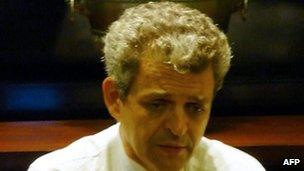
French architect Patrick Henri Devillers, who was living in Cambodia until 2012, was reported to have links to Mr Bo and Ms Gu.
The 52-year-old is believed to have met the couple in the 1990s, while he was living in Dalian with his then wife. Reports said he helped to lay out street grids in the city while Mr Bo was mayor.
In June 2012, he was detained in Cambodia at China's request. He then voluntarily flew to China on 17 July 2012, reportedly as a witness in the Heywood case.
Before leaving for China Mr Devillers made a video which appeared to be an interview with Cambodian officials, saying that he was doing so voluntarily.
Media reports have linked him to a villa in France that reports suggest could be at the heart of charges against Bo Xilai.
Xu Ming
In 2005 Forbes magazine named Xu Ming China's eighth richest man. Mr Xu amassed his fortune in the city of Dalian, where Bo Xilai was mayor from 1993-2001, through his company Dalian Shide, a conglomerate with wide-ranging interests.
But Xu Ming went missing in March 2012, around the same time Mr Bo fell from grace. The Wall Street Journal, citing an unidentified company official, said Mr Xu had called his brother in May to say he was under investigation.
Mr Xu testified in court during Mr Bo's trial. Prosecutors said Mr Bo had accepted bribes from Mr Xu and another businessman, Tang Xiaolin.
According to court transcripts, Mr Xu said he gave Gu Kailai money to buy a villa in France, and paid for some of Bo Guagua's expenses including a trip to Africa and a credit card bill.
Feng Jiang Dolby
Feng Jiang Dolby is a former TV host who has been named in French court documents as the manager of the villa - a role she took over from Neil Heywood and before him Patrick Devillers, the Telegraph reported.
Ms Dolby, who used to work as a presenter for China's state broadcaster CCTV, is based in the UK and married to a British national.
Zhou Yongkang
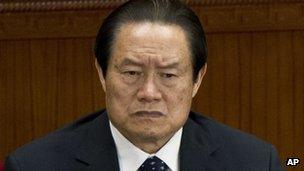
Zhou Yongkang, 70, was a member of the politburo's nine-member Standing Committee, the most powerful committee in China, until the leadership handover in November 2012.
He was also secretary of the Committee of Political and Legislative Affairs, which gave him control over police and security forces.
Before becoming head of the Public Security Ministry in 2003, he was the party head in Sichuan province.
While there, he gained a reputation for dealing firmly with dissent - coming down hard on Tibetan groups and the banned spiritual movement Falun Gong.
He is considered to have been Bo Xilai's mentor and to be close to former President Jiang Zemin, who is still powerful.
In 2012, unverified rumours circulating on Chinese websites said Mr Zhou was under investigation and could be the next to go.
But a report in the Communist Party's mouthpiece, the People's Daily, then made a splash of Mr Zhou visiting the western Xinjiang region.
He represented the region at the Communist Party Congress in November 2012 in Beijing, before retiring from the Standing Committee and the Public Security Ministry later that month.
China announced a corruption investigation against another one of his mentees, Jiang Jiemin, on 1 September. This prompted speculation amongst some that Mr Zhou was in trouble.
Wen Jiabao
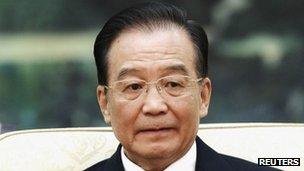
Wen Jiabao was China's premier until March 2013, when his successor Li Keqiang took the reins.
Bo Xilai's dismissal had been interpreted by some as part of a political struggle between supporters of former President Jiang Zemin and supporters of Mr Wen and former President Hu Jintao, who were considered to be more open to reform.
Mr Wen indirectly criticised Bo Xilai at his last National People's Congress news conference in April 2012.
Although he did not name Mr Bo directly, he said that local authorities must "seriously" reflect and learn from the Wang Lijun incident.
He also touched on China's Cultural Revolution, a chaotic 10-year period when normal life was turned on its head.
He warned that China could experience a similar period of instability without political reforms, and that "the mistakes of the Cultural Revolution… have yet to be fully eliminated".
This was seen as criticism of Bo Xilai's approach in Chongqing.
Mr Bo had enjoyed reminding people of the days of the Cultural Revolution by sending volunteers into the countryside and giving rousing speeches about China's communist past - moves that gained him many left-wing supporters.
